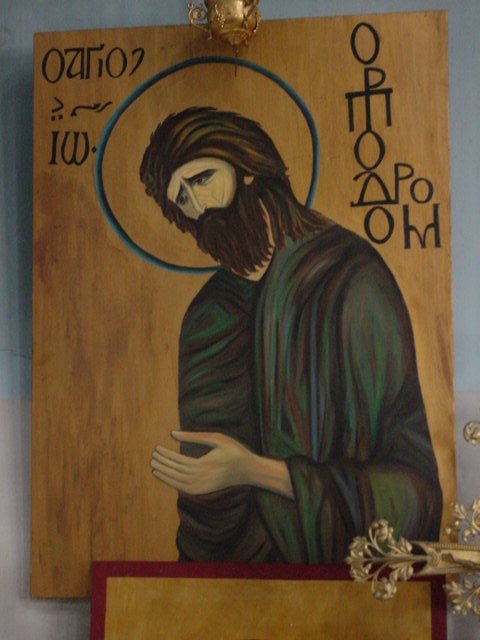September 27, 2001
The olive groves are what make for “roads” these days.
Marthame left early this morning for an adventure to Nablus to run a couple of errands. He caught a shared taxi in Zababdeh on its way there and shared the ride there with the driver - no other passengers. No one is traveling much these days, since there's little work and roads are difficult. So he and the driver chatted the whole way there - a good chance to practice Arabic and to gather a little more Palestinian folk wisdom. They found their way by driving between the olive trees and avoiding the donkey section of the commute (which we had encountered a month ago). Seems the promised opening of closures will have to wait for the end of Yom Kippur and the first anniversary of the Intifada.
The Melkite Church of Rafidiya.
John the Baptist icon in the Melkite Church of Rafidiya.
Marthame headed up to Rafidiya, now a neighborhood of Nablus but once a majority Christian village in the area. This is where many of Nablus' Christians live and is also where many of the churches are. He made a visit to the Greek Melkite Church of St. John the Baptist and a meeting with Abuna Yousef, the parish priest. Abuna Yousef had been a bank employee professionally, but when a succession of several aged foreign priests had passed through the parish, the Bishop approached him asking him to consider being the priest. To make a long story short, after about eight years of the bishop's cajoling and his own discernment and study, he became the priest. He has been there for twenty-one years. The Melkite tradition is akin to Orthodoxy in its liturgy and theology, but their churches are in communion with Rome and are under the authority of the Pope. What this means for the local congregations is that their worship is similar to the Orthodox but follows the Roman calendar (which is usually about two weeks earlier). Also, their priests - like Abuna Yousef - can marry. A few years back, the church in Rafidiya opened a clinic for the area. Anyone who is unable to pay receives treatment free of charge.
Marthame was also hoping to talk to him about the Melkite parish in Zababdeh. Since there is no priest for the parish in Zababdeh, Abuna Yousef is responsible for periodic ritual responsibilities - births, marriages, deaths. But the status of the church here is unclear - the parish is under the responsibility of the Bishop of Haifa, but Abuna Yousef is under the Bishop of Jerusalem, so Zababdeh falls through the cracks. Abuna Yousef has written a small book in English and Arabic on Christians in the Nablus area - should be helpful as we try to get a bead on fellow believers in the Northern West Bank.
Marthame then headed over the the Anglican Compound by Nablus' Old City at the Church of St. Philip's. After chatting with a few of our friends there, he ran into our friend from Holland who works as a nurse in the Anglican hospital of St. Luke's. She had been away on vacation for a while, so it was good to catch up with her.
After a stop at the British Council (which has a great selection of books and videos to borrow), he then made the long, circuitous journey back, this time by way of Jenin (to the north of Zababdeh) and then back down south. A long, circuitous day, but productive. We wrapped up the day with some games with the neighbors and delicious knaffe, Nablus's sweet specialty.



